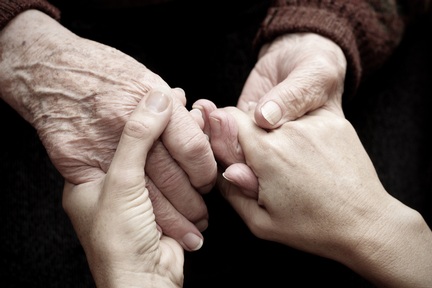Many people no longer expect families to care for them in old age
According to new research, nearly three quarters of people think themselves or others will have care needs in old age.

Yet, a poll of 2,000 people across the UK, commissioned by Bupa, a leading healthcare specialist, found that half of people do not expect to be able to turn to family to look after them if they need it.
Professor Graham Stokes, global director of dementia care at Bupa, said: “The perception that older people aren’t valued by society is concerning and needs to be addressed. The proportion of people over 80 is expected to increase almost fourfold over the next 50 years, so the role they play as well as their needs and desires should be recognised.
“It’s clear from the research that people have some realistic concerns about their needs and potential health challenges in old age, but old age can be a happy and fulfilling time when people are valued and treated with respect.”
The survey revealed that old age is a regular consideration, with nearly a quarter of respondents thinking about what life will be like in old age at least a once each week.
However, research from Independent Age, the charity for older people, warned that families are putting off difficult conversations about ageing until times of crisis, or are not having them at all.
Seven million people aged 65 and over have never talked to their family about key issues such as end-of-life care or where they would like to live if they can no longer live at home.
Janet Morrison, chief executive of Independent Age, said: “For many families, having these conversations will never be easy. For older people, it can mean facing the prospect of losing independence. For their relatives, it can mean facing the thought of losing a loved one or feeling overwhelmed by a sense of responsibility.
“But these are issues that only get more pressing with time. It is vital that families start talking about these issues now, so they’re not left making important decisions at times of crisis or suddenly struggling to cope with significant caring responsibilities.”
Despite concerns about getting older, people are optimistic that they can still live a fulfilling life, with the majority of people believing old age will not stop them living life to the fullest.
The study into attitudes towards ageing marks the launch of a new campaign by Bupa, ‘Person First’, to highlight the benefits of providing personalised care and understanding the needs and wishes of the individual.
‘Person First’ is Bupa’s company-wide principle for aged care and supporting people living with dementia and their families. It is about ensuring that care focuses on the person first and not their condition, listening to and thinking about the person, to meet their needs in the way that they want.
Professor Stokes added: “As we age our preferences and personalities remain individual, which is why, if care is required, it should be provided in a way that meets the person’s needs and wishes.
“This could be through enabling someone living in a care home to walk on the beach if they’ve lived near the sea all their life, or helping people to plant a garden if they have a passion for gardening.”
From 15 July, Bupa will be sharing personal stories to celebrate examples of ‘Person First’ care and demonstrate how starting with the person helps provide a happier older age.
For more information visit: http://www.bupa.co.uk/
Latest News
 29-Jul-24
Dementia Bus gives carehome.co.uk staff insight into life with dementia
29-Jul-24
Dementia Bus gives carehome.co.uk staff insight into life with dementia
 01-Mar-24
Find out the top care homes in 2024
01-Mar-24
Find out the top care homes in 2024
 21-Mar-23
UK's top care homes in 2023 revealed
21-Mar-23
UK's top care homes in 2023 revealed
 03-Jan-23
carehome.co.uk launches free care helpline
03-Jan-23
carehome.co.uk launches free care helpline
 13-Dec-22
5 mins with Emily Whitehurst, chief operating officer for Constantia Healthcare
13-Dec-22
5 mins with Emily Whitehurst, chief operating officer for Constantia Healthcare